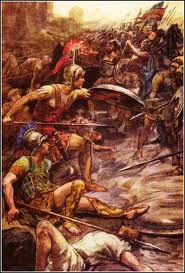Click here for direct link to audio podcast Episode #49. 
Click here for previous episodes.
The Sacred Band was an elite fighting unit of 300 men from the Greek city-state of Thebes. They were famous throughout the ancient world for their invincibility on the battlefield; their success attributed to the fact that the Sacred Band of Thebes was a unit of 150 couples described by Plutarch thus:
“a band cemented by friendship grounded upon love is never to be broken, and invincible; since the lovers, ashamed to be base in sight of their beloved, and the beloved before their lovers, willingly rush into danger for the relief of one another.” ~from Plutarch’s Lives
In today’s podcast, this band is led by Pelopidas against the Spartans. The Sacred Band was undefeated until the Battle of Chaeronea in 338 BCE, where Philip of Macedon annihilated them. After this all-important historical battle, Philip wept and paid homage to the courageous fallen. A tomb was erected, and in the 19th century, excavations discovered 254 bodies arranged in 7 rows.
Listen to today’s podcast to find out how Pelopidas led them to victory against the Spartans in 375 BCE.
A minor surgery has laid me up for a bit, and set us back a couple of weeks. Sorry about that, faithful listeners, including Amanda in Virginia, who used our podcasts to help her understand The Odyssey this past semester. One good thing about this surgery, it got me reading lots about ancient medicine, wounds, surgery, and healing. Did you know that honey was packed into the wounds of men on the battlefield to stop bloodflow and start healing? I have lots more to share with you, but first we must get through Plutarch’s Lives for Boys and Girls.

